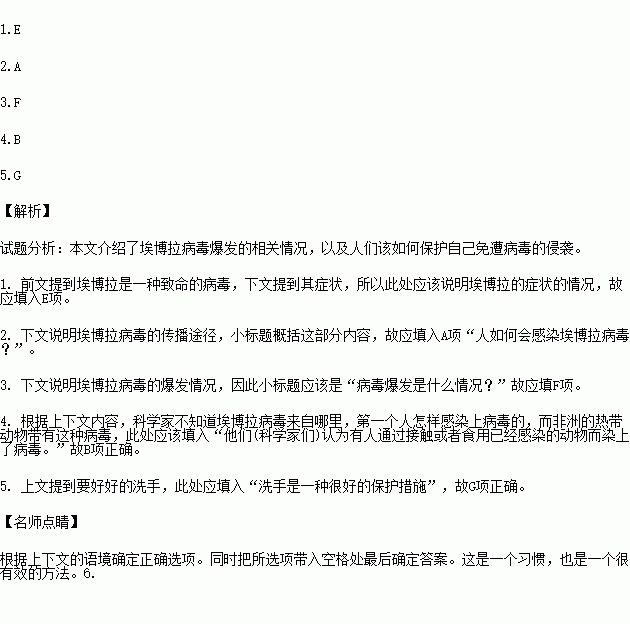题目内容
根据短文内容, 从短文后的选项中选出能填入空白处的最佳选项。选项中有两项为多余选项。
Ebola is a dangerous virus that can cause people to get very sick and even die. The virus is causing the biggest problems in western Africa, where it has spread quickly. 1. But it can get worse and cause life-threatening symptoms(症状), such as bleeding and trouble breathing.
2.
Ebola does not spread like colds or the flu because it does not float through the air. Ebola also doesn’t spread through food or water, like some other viruses. Instead, Ebola spreads when someone touches the body fluids(液体) of a sick person.
3.
An outbreak is when many people are getting sick with the same illness around the same time. You may have heard of a flu outbreak, which is when lots of people get sick from the same types of flu virus. When an outbreak happens because of a virus, more people could get sick because there is a lot of that virus around.
Where did Ebola come from?
Scientists aren’t sure how the first person gets Ebola at the start. 4. Tropical animals in Africa believed to carry the virus include great apes, chimpanzees, gorillas, monkeys, fruit bats, porcupines, and forest antelopes.
What do kids need to do about Ebola?
Ebola is making many people sick in Africa, but no matter where you live, it’s always a good idea to wash your hands well and often. 5.
A. How do people catch Ebola?
B. But they think that people may pick up the virus by touching or eating infected animals.
C. Why do I need to wash my hands?
D. It’s very important that infected people get treatment right away.
E. Ebola symptoms can start with fever and headache, kind of like the flu.
F. What is an outbreak?
G. Keeping hands clean can help protect you from common illnesses like colds and the flu.
 快乐5加2金卷系列答案
快乐5加2金卷系列答案The Healthy Habits Survey shows that only about one third of American seniors have correct habits. Here are some findings and expert advice.
1. How many times did you brush your teeth yesterday? ·Finding: A full 33% of seniors brush their teeth only once a day. ·Step: Remove the 300 types of bacteria in your mouth each morning with a battery-operated toothbrush. Brush gently for 2 minutes, at least twice a day. 2. How many times did you wash your hands or bathe yesterday? ·Finding: Seniors, on average, bathe fewer than 3 days a week. And nearly 30% wash their hands only 4 times a day—half of the number doctors recommend. ·Step: We touch our faces around 3,000 times a day—often inviting germs(病菌)to enter our mouth, nose, and eyes. Use toilet paper to avoid touching the door handle. And, most important, wash your hands often with hot running water and soap for 20 seconds. 3. How often do you think about fighting germs? · Finding: Seniors are not fighting germs as well as they should. · Step: Be aware of germs. Do you know it is not your toilet but your kitchen sponge(海绵)that can carry more germs than anything else? To kill these germs, keep your sponge in the microwave for 10 seconds. |
1.What is found out about American seniors?
A. Most of them have good habits.
B. Nearly 30% of them bathe three days a week.
C. All of them are fighting germs better than expected.
D. About one third of them brush their teeth only once a day
2.Doctors suggest that people should wash their hands ________.
A. eight times a dayB. three times a day
C. four times a dayD. twice a day
3.Which of the following is true according to the text?
A. We should keep from touching our faces.
B. There are less than 300 types of bacteria in the mouth.
C. A kitchen sponge can carry more germs than a toilet.
D. We should wash our hands before touching a door handle.
4.The text probably comes from ________.
A. a guide bookB. a popular magazine
C. a book reviewD. an official document

